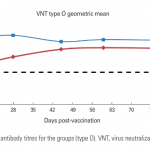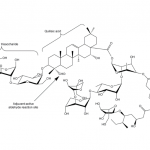
Identification of QS-21 as an Inflammasome-activating Molecular Component of Saponin Adjuvants
Robyn Marty-Roix, Gregory I. Vladimer, Kimberly Pouliot, Dan Weng, Rachel Buglione-Corbett, Kim West,John D. MacMicking, Jonathan D. Chee, Shixia Wang, Shan Lu, and Egil Lien
Many immunostimulants act as vaccine adjuvants via activa- tion of the innate immune system, although in many cases it is unclear which specific molecules contribute to the stimulatory activity. QS-21 is a defined, highly purified, and soluble saponin adjuvant currently used in licensed and exploratory vaccines, including vaccines against malaria, cancer, and HIV-1. How- ever, little is known about the mechanisms of cellular activation induced by QS-21. We observed QS-21 to elicit caspase-1-de- pendent IL-1 and IL-18 release in antigen-presenting cells such as macrophages and dendritic cells when co-stimulated with the TLR4-agonist adjuvant monophosphoryl lipid A. Fur- thermore, our data suggest that the ASC-NLRP3 inflammasome is responsible for QS-21-induced IL-1 /IL-18 release. At higher concentrations, QS-21 induced macrophage and dendritic cell death in a caspase-1-, ASC-, and NLRP3-independent manner, whereas the presence of cholesterol rescued cell viability. A nanoparticulate adjuvant that contains QS-21 as part of a heter- ogeneous mixture of saponins also induced IL-1 in an NLRP3- dependent manner. Interestingly, despite the role NLRP3 plays for cellular activation in vitro, NLRP3-deficient mice immu- nized with HIV-1 gp120 and QS-21 showed significantly higher levels of Th1 and Th2 antigen-specific T cell responses and increased IgG1 and IgG2c compared with wild type controls. Thus, we have identified QS-21 as a nonparticulate single molecular saponin that activates the NLRP3 inflammasome, but this signaling pathway may contribute to decreased antigen- specific responses in vivo.
MartyRoixEtAl2016-IdentificationQs21AsInflammasomeActivatingMolecularCom...



